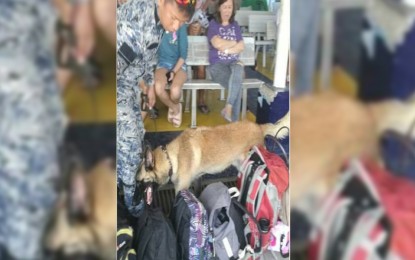
RANDOM INSPECTION. A member of the Philippine Coast Guard-Central Visayas K9 unit conducts random inspection with the help of a drug-sniffing dog on the luggage of passengers in a pier in Cebu City. (Photo courtesy of the Philippine Coast Guard-Central Visayas)
CEBU CITY – The Philippine Coast Guard (PCG) in Central Visayas is currently intensifying intelligence monitoring in all the ports here in collaboration with shipping companies, the ports authority, and law enforcement units, in view of the Duterte administration’s campaign against illegal drugs.
Lieutenant Junior Grade Michael Encina, regional spokesman of the PCG, said that while the coast guard in the region has the capabilities in anti-drug interdiction, they also rely on intensive intelligence gathering.
“It would be better to have modern equipment for monitoring the ports against drugs. But in the meantime, we have strong intelligence networks and collaborative relations among other agencies,” Encina told the Philippine News Agency in an interview on Tuesday.
He said that the PCG has been religiously conducting maritime mandatory pre-departure inspections in all the major ports of the region. “We check certificates as well as the vessel’s safety precautions,” he added.
The coast guard in Central Visayas has six dogs deployed in major ports in Cebu and Bohol, Encina noted. Two are narcotics sniffing dogs, two are explosives sniffing, and two are for search and rescue.
Encina said the search and rescue dogs were tested during the landslide incident in Barangay Tinaan, Naga, in Cebu last September.
He said while it is difficult to inspect every vehicle, passenger, and luggage at the ports without delaying the departure of passenger vessels, they rely on intensified intelligence gathering to ensure the safety and security of every port.
“The economic side of the maritime industry must not be affected in the implementation of the anti-drug campaign of the government,” Encina said in Filipino, stressing that the time of vessel’s departure must not be sacrificed.
PCG-Central Visayas K9 units are constantly conducting random checks in all terminals, he added.
Encina said he sees the value of collaborative effort between the coast guard and other agencies, such as the Philippine Drug Enforcement Units (PDEA), Philippine National Police (PNP) Maritime, Philippine Navy, Maritime Industry Authority (Marina), and the Bureau of Fisheries and Aquatic Resources in the region in implementing anti-drug interdiction in all ports.
The PCG, he said, has also recognized the active participation of the PCG Auxiliary in ensuring safety and security in the ports.
“We have this so-called Passenger Assistance Center (PAC) in major ports in Region 7. These PACs are manned by the Philippine Coast Guard Auxiliary (PCGA) officers and men,” Encina said. “Passengers who have concerns can talk to our PCGA guys at the PCAs.” (PNA)
